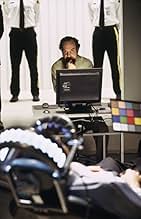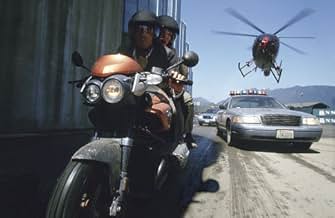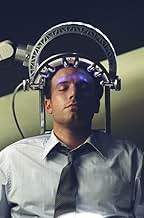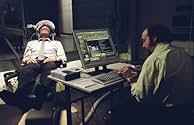A technical wizard learns that his memory has been erased.A technical wizard learns that his memory has been erased.A technical wizard learns that his memory has been erased.
- Awards
- 3 wins & 2 nominations total
Dee Jay Jackson
- Guard
- (as Deejay Jackson)
- Director
- Writers
- All cast & crew
- Production, box office & more at IMDbPro
Featured reviews
Rating: ** out of ****
I wonder what it says about the state of cinematic science fiction that most of author Philip K. Dick's adaptations generally mix high-octane action with its interesting sci-fi concepts. Paycheck is no exception, hardly a surprise when you note it's from once beloved Hong Kong filmmaker John Woo, who's quickly reaching Michael Bay/Roland Emmerich levels of notoriety in the U.S. with each regressive film.
To be fair, Paycheck isn't unenjoyable, and it even gets off to a pretty good start. Set sometime in the near future, there's not much of a noticeable difference with our present time except for a few elaborate-looking gadgets and computers. Ben Affleck stars as Michael Jennings, a reverse engineer who's hired by major corporations to build products superior to all rival companies. Afterwards, his memory is erased by a partner of his (Paul Giamatti) and he's given a large paycheck for his time and troubles (usually the whole process takes about three months).
His latest offer comes from an old friend of his (Aaron Eckhart), who promises an eight-figure deal at the end of the transaction. The catch is that the whole procedure will take three years. Despite some reluctance, he agrees to the deal and when the three years pass by, Jennings, thinking he's a rich man, is shocked to discover he gave up over ninety million dollars in favor of an envelope containing twenty everyday household items. Now he finds himself on the run from both the FBI and the company that hired him, and must set out to discover what he built during those three years he's missing.
Uma Thurman also stars in the movie as Jennings' girlfriend during that three-year span, but she factors so lazily into the picture, she's obviously only in the film so that a) Jennings can have a love interest and b) he can also have someone to talk to about every little discovery he makes. Then again, function "b" could have worked just as well with Giamatti, but everyone knows a "sexy" chick is a better sell (I have to put quote marks around sexy because Thurman looks positively haggard for almost every minute of screen time she's present; I can't help but feel the much hotter Kathryn Morris would have done better in the role).
There are two concepts in this movie that specifically intrigue me (some moderate spoilers here), the first one is choosing deliberately to erase your own memory, but the notion is forgotten after the first half-hour. I was quite curious to know exactly what the process is like to the subject. Take, for instance, the fact that he lost his memory over the three-year span. Does the last thing he remembers feel like a three-year old memory or an event that happened just a second ago? Instead, all we get is a half-hearted (actually, not even that much) attempt at a sorrowful romance because he can't remember his girlfriend and she's not very happy about that.
The other major sci-fi concept, the ability to see into the future, isn't explored with much more interest and it leads to a number of baffling questions. You see (quite a few spoilers here), it's revealed Jennings sent himself those twenty items because they can come in handy at a specific moment that'll help him survive or escape from a dangerous situation.
But the thing is, Jennings couldn't have known each item would come in handy unless he used the device he built at least twenty times, because there's no way he'd know a motorcycle would come in handy if he never had, say, the bus ticket to escape from the FBI, meaning he used the device to see what he needed to escape the FBI, but still foresaw that he'd be killed in even more future events. That would mean this guy was originally destined to die or get caught in well over ten different scenarios (i.e. he had the bus ticket to escape, but if he didn't have the motorbike keys, he wouldn't have gotten further, and so on and so forth), but this is never really addressed.
By John Woo standards, there's surprisingly only a modest amount of action in the film, but at least the material is competently handled, even if it's not entirely believable. What might work in movies that establish their characters as supercops with impeccable aims doesn't come off quite as well in action scenes that feature scientists beating up a large number of armed goons. But if you suspend disbelief, the action scenes are pretty fun (especially the motorcycle chase and the laboratory battle), and coupled with the relatively fast pace, keep the movie perfectly watchable despite the poor script and mediocre acting (I never got into specifics, but this is Ben Affleck and Uma Thurman we're talking about).
When all is said and done, Paycheck is a wasted opportunity and is never as memorable a mixture of science fiction, mystery, and action as Minority Report, but it's likely to do the trick for undemanding fans of any of these genres. If you expect more, well, you'd do best to remember this is John Woo we're talking about, not Steven Spielberg.
I wonder what it says about the state of cinematic science fiction that most of author Philip K. Dick's adaptations generally mix high-octane action with its interesting sci-fi concepts. Paycheck is no exception, hardly a surprise when you note it's from once beloved Hong Kong filmmaker John Woo, who's quickly reaching Michael Bay/Roland Emmerich levels of notoriety in the U.S. with each regressive film.
To be fair, Paycheck isn't unenjoyable, and it even gets off to a pretty good start. Set sometime in the near future, there's not much of a noticeable difference with our present time except for a few elaborate-looking gadgets and computers. Ben Affleck stars as Michael Jennings, a reverse engineer who's hired by major corporations to build products superior to all rival companies. Afterwards, his memory is erased by a partner of his (Paul Giamatti) and he's given a large paycheck for his time and troubles (usually the whole process takes about three months).
His latest offer comes from an old friend of his (Aaron Eckhart), who promises an eight-figure deal at the end of the transaction. The catch is that the whole procedure will take three years. Despite some reluctance, he agrees to the deal and when the three years pass by, Jennings, thinking he's a rich man, is shocked to discover he gave up over ninety million dollars in favor of an envelope containing twenty everyday household items. Now he finds himself on the run from both the FBI and the company that hired him, and must set out to discover what he built during those three years he's missing.
Uma Thurman also stars in the movie as Jennings' girlfriend during that three-year span, but she factors so lazily into the picture, she's obviously only in the film so that a) Jennings can have a love interest and b) he can also have someone to talk to about every little discovery he makes. Then again, function "b" could have worked just as well with Giamatti, but everyone knows a "sexy" chick is a better sell (I have to put quote marks around sexy because Thurman looks positively haggard for almost every minute of screen time she's present; I can't help but feel the much hotter Kathryn Morris would have done better in the role).
There are two concepts in this movie that specifically intrigue me (some moderate spoilers here), the first one is choosing deliberately to erase your own memory, but the notion is forgotten after the first half-hour. I was quite curious to know exactly what the process is like to the subject. Take, for instance, the fact that he lost his memory over the three-year span. Does the last thing he remembers feel like a three-year old memory or an event that happened just a second ago? Instead, all we get is a half-hearted (actually, not even that much) attempt at a sorrowful romance because he can't remember his girlfriend and she's not very happy about that.
The other major sci-fi concept, the ability to see into the future, isn't explored with much more interest and it leads to a number of baffling questions. You see (quite a few spoilers here), it's revealed Jennings sent himself those twenty items because they can come in handy at a specific moment that'll help him survive or escape from a dangerous situation.
But the thing is, Jennings couldn't have known each item would come in handy unless he used the device he built at least twenty times, because there's no way he'd know a motorcycle would come in handy if he never had, say, the bus ticket to escape from the FBI, meaning he used the device to see what he needed to escape the FBI, but still foresaw that he'd be killed in even more future events. That would mean this guy was originally destined to die or get caught in well over ten different scenarios (i.e. he had the bus ticket to escape, but if he didn't have the motorbike keys, he wouldn't have gotten further, and so on and so forth), but this is never really addressed.
By John Woo standards, there's surprisingly only a modest amount of action in the film, but at least the material is competently handled, even if it's not entirely believable. What might work in movies that establish their characters as supercops with impeccable aims doesn't come off quite as well in action scenes that feature scientists beating up a large number of armed goons. But if you suspend disbelief, the action scenes are pretty fun (especially the motorcycle chase and the laboratory battle), and coupled with the relatively fast pace, keep the movie perfectly watchable despite the poor script and mediocre acting (I never got into specifics, but this is Ben Affleck and Uma Thurman we're talking about).
When all is said and done, Paycheck is a wasted opportunity and is never as memorable a mixture of science fiction, mystery, and action as Minority Report, but it's likely to do the trick for undemanding fans of any of these genres. If you expect more, well, you'd do best to remember this is John Woo we're talking about, not Steven Spielberg.
"Paycheck" is yet another adaptation of a Philip Dick short story that tones down his political criticism and cynicism to make a sci fi adventure flick, this time pretty much as an expensive and clever "McGyver" episode. You can tell how this is expanded from a story where the hero had five items/clues and now he has 20.
Ben Affleck is a bland Ken Doll of a hero, though Uma Furman has almost as much spunk as she did in "Kill Bill, Volume 1."
As a John Woo movie, of course the chase scenes are the best part. But the fight scenes are simply perplexing -- uh, why does Affleck's work out consist of electronic samurai stick fighting such that when the poorly-aiming bad guys all come at him with guns Uma throws him a stick to pick them off?
While I did see the movie on a scratchy print with tinny sound, I don't think that explained the confusingly bad continuity in the hair and make-up such that I thought they had been time-traveling at some tropical vacation in between scenes.
Ben Affleck is a bland Ken Doll of a hero, though Uma Furman has almost as much spunk as she did in "Kill Bill, Volume 1."
As a John Woo movie, of course the chase scenes are the best part. But the fight scenes are simply perplexing -- uh, why does Affleck's work out consist of electronic samurai stick fighting such that when the poorly-aiming bad guys all come at him with guns Uma throws him a stick to pick them off?
While I did see the movie on a scratchy print with tinny sound, I don't think that explained the confusingly bad continuity in the hair and make-up such that I thought they had been time-traveling at some tropical vacation in between scenes.
Philip K Dick wrote many stories which seemed to have great film potential. I never thought of this as one of them.
I have seen Ben Affleck in a number of films, and felt that he was good in a few, OK in most, and positively annoying in some.
I saw the horrible, misleading trailers.
The soundtrack was simply bad.
So, needless to say, I went into Paycheck with very low expectations.... and I was pleasantly surprised.
Affleck plays a talented reverse-engineer, who sees the possibilities in new technology, and is able to carry it through to fruition. He takes on top-secret jobs and has his memory erased upon the completion of each. He decides to take on a project big and profitable enough to allow him to retire comfortably for the rest of his life. He completes the project, goes through the memory erasure, and then starts to discover what he has done, and, pursued by corporate hit men and the police, tries to recover his memory. Uma Thurmond, a biologist he had fallen in love with, is one of the memories he wants to recover, and also a target.
Paycheck is more of an action film than a sci fi flick. The plot serves the action, as do the somewhat one-dimensional characters. And there is so little chemistry between Affleck and Thurmond that the romantic subplot is almost just a distraction. Despite these flaws, I spent an evening being thoroughly entertained by this rehashing of the usual technology-run-amok / knowledge-is-power story. This film is very Hollywood, and uses a lot of slick and clichéd camera-work, but nevertheless tells a good story and does it well enough.
I have seen Ben Affleck in a number of films, and felt that he was good in a few, OK in most, and positively annoying in some.
I saw the horrible, misleading trailers.
The soundtrack was simply bad.
So, needless to say, I went into Paycheck with very low expectations.... and I was pleasantly surprised.
Affleck plays a talented reverse-engineer, who sees the possibilities in new technology, and is able to carry it through to fruition. He takes on top-secret jobs and has his memory erased upon the completion of each. He decides to take on a project big and profitable enough to allow him to retire comfortably for the rest of his life. He completes the project, goes through the memory erasure, and then starts to discover what he has done, and, pursued by corporate hit men and the police, tries to recover his memory. Uma Thurmond, a biologist he had fallen in love with, is one of the memories he wants to recover, and also a target.
Paycheck is more of an action film than a sci fi flick. The plot serves the action, as do the somewhat one-dimensional characters. And there is so little chemistry between Affleck and Thurmond that the romantic subplot is almost just a distraction. Despite these flaws, I spent an evening being thoroughly entertained by this rehashing of the usual technology-run-amok / knowledge-is-power story. This film is very Hollywood, and uses a lot of slick and clichéd camera-work, but nevertheless tells a good story and does it well enough.
Michael Jennings is a reverse engineer who, in exchange for big money, takes items apart in order to rebuild them for other companies. After every job his memory is wiped back to the moment he started the job. When he is offered a massive payday to do a three-year job for friend James Rethrick he accepts. Next thing he knows it is three years later and the job done. He goes to collect his money but finds that he has waived his right to it and replaced it with a package full of strange objects. When he is set up with the FBI he goes on the run and realises that the objects are all clues or aids in his mission - a mission that he himself has arranged.
There's nothing quite like a good action movie that allows you to accept whatever the plot is as it presents good solid action. This film almost manages it and it is ironic that the concept from Dick is what weakens it. The plot is a bit of a stretch but once you accept it you can move on - like Face/Off, once you get the idea and accept it you can enjoy the action. However with Paycheck you are only left alone for 10 minutes before you have to accept the stretched plot all over again. Every time an item perfectly fits a situation you have to accept the whole concept over again. The problem is that the items are far too specific. With the lottery number strip it works, however with the paperclip and the bullet it is too much of a stretch and took the enjoyment off the action a bit.
Happily it is only a bit. The plot as an idea works pretty well but has been done better elsewhere (Bourne Identity and Total Recall for example) it is presented too full of holes that appear with the slightest picking. It would have been much better if the items had been bigger in terms of meaning rather than very specific (e.g. the lighter and hairspray), bigger clues and so on would have been better. However the action is still pretty good, not quite classic Woo but full or good touches. The film has a good steady pace to it and it keeps it up for the majority - very quickly getting through the set up and jumping to three years hence. The action is enjoyably slick and makes good use of effects; true, some of the set ups in the scenes is stretched, and some of the stuff about the weapons is just dumb (a fired bullet with it's casing, a bullet being fired by a thick piece of metal etc), however if you can accept the plot then I imagine accepting that Woo often takes style over substance shouldn't be a problem.
The cast is so-so despite having a surprising amount of famous faces. Affleck is better than usual; because he is quite ordinary he plays an everyman pretty well and it is easy to see him as a `normal' guy. Eckhart is reasonably good but he has limited screen time. It's good to see him in big films like this as he is an interesting guy, but I hope he doesn't just turn off his skills. Giamatti is in the film briefly and is OK comic relief but Thurman has been miscast. She does most of the film pretty well but her early scenes as an expert biologist are laughable she is so inept! The support cast features a really good turn from Feore as well as good roles from Morton and the wonderful Hall - although the roles are practically cameos.
Overall this is an enjoyable little action movie but it is ironic that the story is both interesting and the film's weak point. The items are too specific and, each time Jennings uses one, it forces the audience to accept the unlikely premise all over again. Worth seeing for enjoyable action delivered by a director who recovers some of his form here.
There's nothing quite like a good action movie that allows you to accept whatever the plot is as it presents good solid action. This film almost manages it and it is ironic that the concept from Dick is what weakens it. The plot is a bit of a stretch but once you accept it you can move on - like Face/Off, once you get the idea and accept it you can enjoy the action. However with Paycheck you are only left alone for 10 minutes before you have to accept the stretched plot all over again. Every time an item perfectly fits a situation you have to accept the whole concept over again. The problem is that the items are far too specific. With the lottery number strip it works, however with the paperclip and the bullet it is too much of a stretch and took the enjoyment off the action a bit.
Happily it is only a bit. The plot as an idea works pretty well but has been done better elsewhere (Bourne Identity and Total Recall for example) it is presented too full of holes that appear with the slightest picking. It would have been much better if the items had been bigger in terms of meaning rather than very specific (e.g. the lighter and hairspray), bigger clues and so on would have been better. However the action is still pretty good, not quite classic Woo but full or good touches. The film has a good steady pace to it and it keeps it up for the majority - very quickly getting through the set up and jumping to three years hence. The action is enjoyably slick and makes good use of effects; true, some of the set ups in the scenes is stretched, and some of the stuff about the weapons is just dumb (a fired bullet with it's casing, a bullet being fired by a thick piece of metal etc), however if you can accept the plot then I imagine accepting that Woo often takes style over substance shouldn't be a problem.
The cast is so-so despite having a surprising amount of famous faces. Affleck is better than usual; because he is quite ordinary he plays an everyman pretty well and it is easy to see him as a `normal' guy. Eckhart is reasonably good but he has limited screen time. It's good to see him in big films like this as he is an interesting guy, but I hope he doesn't just turn off his skills. Giamatti is in the film briefly and is OK comic relief but Thurman has been miscast. She does most of the film pretty well but her early scenes as an expert biologist are laughable she is so inept! The support cast features a really good turn from Feore as well as good roles from Morton and the wonderful Hall - although the roles are practically cameos.
Overall this is an enjoyable little action movie but it is ironic that the story is both interesting and the film's weak point. The items are too specific and, each time Jennings uses one, it forces the audience to accept the unlikely premise all over again. Worth seeing for enjoyable action delivered by a director who recovers some of his form here.
'Paycheck' is an action thriller with some amazing action sequences in the vain of the 'Bourne' films.
Ben Affleck stars as a brilliant computer engineer, Jennings, who must analyze a computer for a rival company. Once done, his memory for the time period it took him to do the job, is erased. His good billionaire friend, Rethrick, then offers him a job that could last up to three years. When Jennings accepts, the film jumps ahead three years, leaving the viewer wondering what the hell he did.
The plot then thickens when Jennings is told he forfeited his share, and is given an envelope with everyday items instead. Jennings then finds himself in a cat and mouse game on the run from the company - and Rethrick - he worked for. With only the contents of the envelope to unravel the mystery, the film is an interesting concept, and the viewer unravels it together with Jennings.
Uma Thurman serves as the film's love interest, Rachel.
'Paycheck' has a great production design and great action sequences and visuals. Although not always believable, it was a lot of fun! This was highly entertaining!
Ben Affleck stars as a brilliant computer engineer, Jennings, who must analyze a computer for a rival company. Once done, his memory for the time period it took him to do the job, is erased. His good billionaire friend, Rethrick, then offers him a job that could last up to three years. When Jennings accepts, the film jumps ahead three years, leaving the viewer wondering what the hell he did.
The plot then thickens when Jennings is told he forfeited his share, and is given an envelope with everyday items instead. Jennings then finds himself in a cat and mouse game on the run from the company - and Rethrick - he worked for. With only the contents of the envelope to unravel the mystery, the film is an interesting concept, and the viewer unravels it together with Jennings.
Uma Thurman serves as the film's love interest, Rachel.
'Paycheck' has a great production design and great action sequences and visuals. Although not always believable, it was a lot of fun! This was highly entertaining!
Did you know
- TriviaThis was Ben Affleck's biggest paycheck to date, earning him approximately $15 million. Whenever he's asked to why he starred in the film, he responds "The answer lies in the title".
- GoofsThe "checkpoint" from where Michael's memory was supposed to be erased after finishing his first job is shown in a monitor as him walking with the box under his arm. However, he wouldn't have this image in his brain, but instead one from his own point of view.
- Quotes
Michael Jennings: [quoting from a fortune cookie strip] If you only look where you can't go, you will miss the riches below.
- ConnectionsEdited into Paycheck: Deleted/Extended Scenes (2004)
- SoundtracksMinute Waltz in D Flat Major Op. 64 No. 1
by Frédéric Chopin
Performed by Lincoln Mayorga
Courtesy of Townhall Records
- How long is Paycheck?Powered by Alexa
Details
- Release date
- Countries of origin
- Language
- Also known as
- El Pago
- Filming locations
- Production companies
- See more company credits at IMDbPro
Box office
- Budget
- $60,000,000 (estimated)
- Gross US & Canada
- $53,790,451
- Opening weekend US & Canada
- $13,462,374
- Dec 28, 2003
- Gross worldwide
- $117,248,958
- Runtime
- 1h 59m(119 min)
- Color
- Sound mix
- Aspect ratio
- 2.39 : 1
Contribute to this page
Suggest an edit or add missing content




































